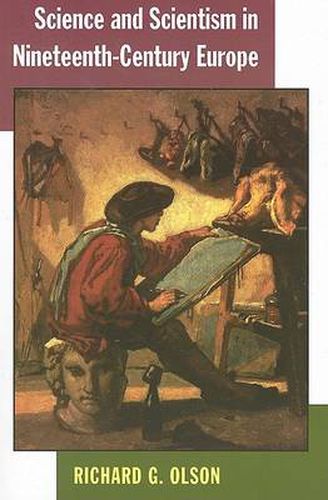Readings Newsletter
Become a Readings Member to make your shopping experience even easier.
Sign in or sign up for free!
You’re not far away from qualifying for FREE standard shipping within Australia
You’ve qualified for FREE standard shipping within Australia
The cart is loading…






Exploring the natural scientific foundations of far-reaching social ideologies
The nineteenth century produced scientific and cultural revolutions that forever transformed modern European life. Although these critical developments are often studied independently, Richard G. Olson’s Science and Scientism in
Nineteenth-Century Europe provides an integrated account of the history of science and its impact on intellectual and social trends of the day. Focusing on the natural scientific foundations underlying liberalism, socialism, positivism, communism, and social Darwinism, Olson explores how these movements employed science to clarify their own understanding of Enlightenment ideals, as well as their understanding of progress, religion, industry, imperialism, and racism. Starting with the impact of the French Revolution on scientific thought, Olson engages with key texts from J. B. Say, Henri Saint-Simon, Kant, Goethe, Darwin, Walter Bagehot, and Edward Bellamy to demonstrate the complex set of forces that shaped nineteenth-century thinking.
$9.00 standard shipping within Australia
FREE standard shipping within Australia for orders over $100.00
Express & International shipping calculated at checkout
Exploring the natural scientific foundations of far-reaching social ideologies
The nineteenth century produced scientific and cultural revolutions that forever transformed modern European life. Although these critical developments are often studied independently, Richard G. Olson’s Science and Scientism in
Nineteenth-Century Europe provides an integrated account of the history of science and its impact on intellectual and social trends of the day. Focusing on the natural scientific foundations underlying liberalism, socialism, positivism, communism, and social Darwinism, Olson explores how these movements employed science to clarify their own understanding of Enlightenment ideals, as well as their understanding of progress, religion, industry, imperialism, and racism. Starting with the impact of the French Revolution on scientific thought, Olson engages with key texts from J. B. Say, Henri Saint-Simon, Kant, Goethe, Darwin, Walter Bagehot, and Edward Bellamy to demonstrate the complex set of forces that shaped nineteenth-century thinking.